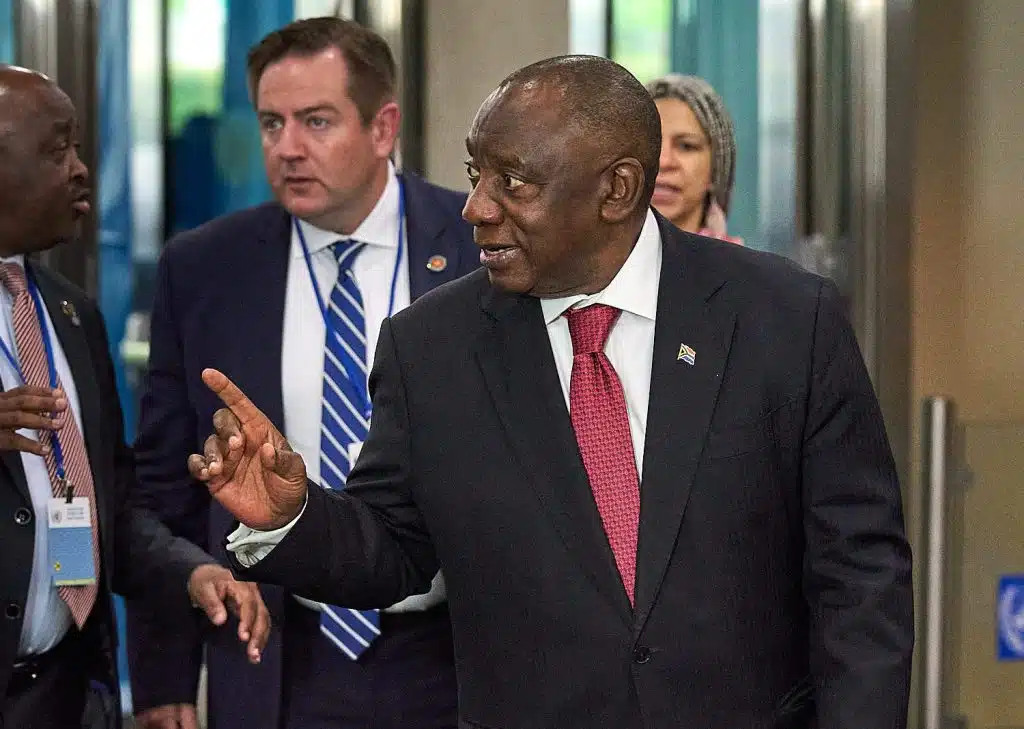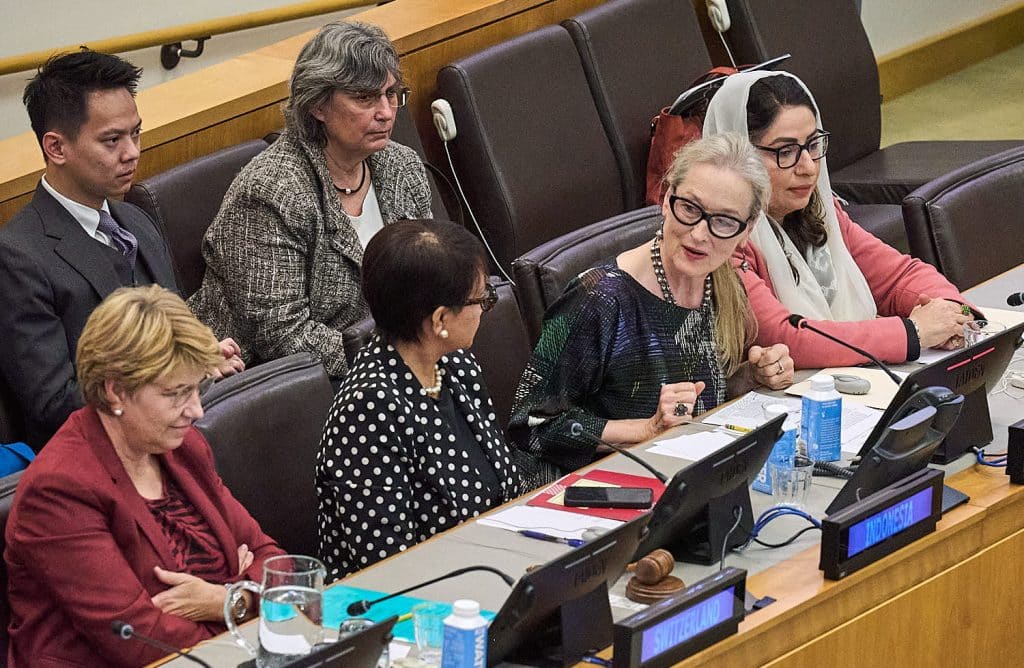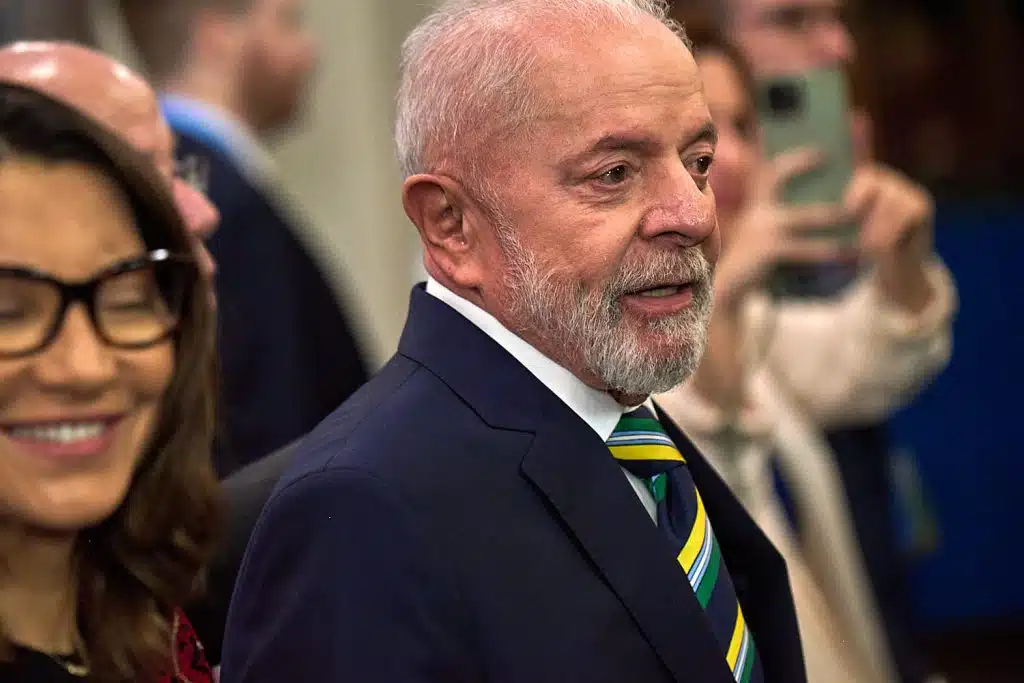
South Africa: ‘We Know What Apartheid Looks Like’
President Cyril Ramaphosa — whose government brought the genocide case against Israel at the International Court of Justice (ICJ) in December — cited South Africa’s grim status as the country that spawned apartheid as he urged renewed efforts to end the war in Gaza.
In an address to the UN General Assembly on Tuesday, Ramaphosa, 71, criticized the structure of the Security Council, which he said had failed its mandate to maintain global peace and security. He also pressed the developed world to deliver its promises to the global South to subsidize climate change mitigation and adaptation.
Expressing alarm at the spread of Mpox, he appealed to the international community “to mobilise vaccine stockpiles . . . for deployment where they are most needed” and endorsed UN Secretary-General António Guterres’s call for reforms “to enable developing countries to lift themselves out of the quicksand of debt.”
Speaking as Israel widened its nearly yearlong assault on Gaza to attack Hezbollah in Lebanon, Ramaphosa said it was UN pressure over the decades that had helped to end white-minority rule in South Africa, resulting in the country’s first democratic elections 30 years ago this year.
“Apartheid was declared a crime against humanity and a stain on the conscience of the world,” he said. “The United Nations took a stand against it. . . .
“The violence the Palestinian people are being subjected to is a grim continuation of more than half-a-century of apartheid. We South Africans know what apartheid looks like. We lived through it. We suffered and died under it.
“We will not remain silent and watch as apartheid is perpetrated against others. Through the United Nations and the instruments it wields, we must end this suffering,” Ramaphosa said.
Referring to the ICJ ruling that South Africa’s genocide accusation against the Jewish state was “plausible,” Ramaphosa noted that countries aiding the commission of genocide in Gaza were violating the Genocide Convention.
Israel’s main arms supplier is the United States, which, as one of the five permanent members of the Security Council, has regularly used its veto to protect its client state. But in a departure from its normal support in March, the US abstained when the Council passed a resolution calling for an immediate ceasefire in Gaza. That has not happened.
Ramaphosa said the Council’s structure as “an exclusive club of five” had remained largely unchanged for 78 years. “Achieving and maintaining peace and security requires the collective will of the community of nations. It requires that the UN Security Council is representative and inclusive . . . the Council must be reformed as a matter of urgency,” he said to applause.
Turning to the climate crisis, Ramaphosa argued that global efforts to sharply cut carbon emissions could not be allowed to “deepen global inequality or stifle the developmental aspirations of the global South.”
According to a Reuters report in November, South Africa — the world’s 11th-biggest greenhouse gas emitter — will miss its binding 2030 carbon emissions targets under the Paris climate agreement. The country relies heavily on coal-fired power plants. At the climate change conference in Glasgow (COP26), France, Germany, Britain, the US and the European Union agreed to provide South Africa $8.5 billion between 2023 and 2027 to help it transition to renewable energy.
But Ramaphosa said: “The industrialised nations are not honouring their climate commitments, and we repeat the call for predictable and sustainable financing for climate action. . . .”
“Pursuing sustainable development necessitates that those with the means should support those who lack them.” — ANTON FERREIRA




The Rights of Female Cats in Afghanistan
Meryl Streep, the Oscar-winning American actress, warned that the rapid deterioration of women’s rights under the Taliban in Afghanistan is “a cautionary tale for the rest of the world.” Streep, 75, was the star panelist at a UN event on Sept. 23, as she whisked into a large conference room with three expat Afghan women advocates for an event titled “The Inclusion of Women in the Future of Afghanistan.” The Afghan panelists were Fawzia Koofi, Habiba Sarabi and Asila Wardak.
Streep’s remarks soon went viral, notably for her poetic description of how restrictive life is for women in Afghanistan: “Today in Kabul, a female cat has more freedoms than a woman. A cat may go sit on her front stoop and feel the sun on her face. She may chase a squirrel into the park. A squirrel has more rights than a girl in Afghanistan today because the public parks have been closed to women and girls by the Taliban. A bird may sing but a girl and a woman may not. This is extraordinary, This is a suppression of the natural law.”
Organized by the Women’s Forum on Afghanistan, and cosponsored by Indonesia, Ireland, Qatar and Switzerland, the program also featured the president of Switzerland, Viola Amherd; Indonesian Foreign Minister Retno Marsudi; Micheal Martin, Ireland’s foreign minister; and Lowlah bint Rashid Al-Khater, Indonesia’s minister of international cooperation.
The event not only highlighted the dire conditions continuously confronting women and girls in Afghanistan, but how quickly the rights of women and girls can be dismantled in that country and elsewhere, as Streep suggested.
The Taliban, the de facto government of the country since mid-August 2022, have enacted more than 70 laws, enforced arbitrarily by the Ministry for the Promotion of Virtue and the Prevention of Vice, which increasingly suppress the human rights of women and girls. Afghan women are not allowed to work, with some exceptions, or even to speak too loudly in public, according to the latest edict. They cannot show their faces or go outside without a male relative. Parks are off-limits without a male chaperone. School ends for girls at the sixth grade. The maternal mortality rate for women in Afghanistan has increased 50 percent since the return of the Taliban.
More than 90 percent of Afghanistan’s women and girls say they are depressed or anxious. Their disappearance from nearly all aspects of public life has also depressed the economy, which has declined by about one-third since 2020.
“We want the Security Council to unite,” Fawzia Koofi, a former Afghanistan parliamentarian, said. “Leave aside your political differences. . . . It happens to us today, it will happen to you tomorrow.”
Although the panelists were asked by Margot Wallstrom, a former foreign minister of Sweden and chair of the Women’s Forum on Afghanistan, for solutions to the gender crisis, immediate remedies remain elusive. Yet, Koofi emphasized that recognition of the Taliban by the rest of the world is unacceptable. — LAURA KIRKPATRICK




Brazil: Reform the ‘Paralyzed’ UN
“We are approaching the end of the first quarter of the 21st century with the United Nations increasingly empty and paralyzed,” Brazilian President Luiz Inácio Lula da Silva, 77, said on Tuesday as the first head of state to address the opening debate of the 79th session of the UN General Assembly in New York City.
“It is time to react vigorously to this situation,” he said, just a day after UN member states approved a Pact for the Future to recommit to multilateralism, including the organization’s UN Charter.
In his second address to the General Assembly of his third nonconsecutive term as president, Lula, who previously led Brazil from 2003 to 2010, said: “We need to think about reviewing and revising the [UN] Charter comprehensively.” He proposed transforming the Economic and Social Council, or Ecosoc, into the “main forum for dealing with sustainable development and the fight against climate change with a real capacity to inspire financial institutions.”
He proposed revitalizing the General Assembly’s role so it could address matters of international peace and security more assertively, complementing the Security Council with more vigor. The Council, he added, should be reformed to include new permanent members from Latin America and Africa, since their exclusion “is an unacceptable echo of domination practices from the colonial past.”
Lula urged the UN reform steps as 2023 and this year so far have experienced the highest number of conflicts since World War II, he said, and climate disasters are expanding worldwide. As he spoke, the Amazon forest, most of which is located in Brazilian territory, is suffering from its worst drought in 70 years, as wildfires burn for almost three months and smoke is covering nearly 60 percent of the country.
He also spoke about the need to defend democracy as the far-right movement grows in his own country and elsewhere in Latin America. The world should protect institutions from “extremists, messianic and totalitarian attacks, which spread hatred, intolerance and resentments,” he said. –– MAURIZIO GUERRERO
Argentina: Milei Blasts the UN’s ‘Ideological Agenda’
The UN has moved from “an organization that pursued peace to an organization that imposes an ideological agenda on its members about an endless list of topics,” Argentine President Javier Milei, 53, said on Tuesday in his first address to the General Assembly.
The UN, he said, “attempts to impose on citizens of the world a specific way of living,” while the Sustainable Development Goals — adopted by consensus to eradicate poverty and hunger and ensure gender equality worldwide by 2030 — were “nothing but a supranational government program that is socialist in shape.”
The speech of Milei, a self-described anarcho-capitalist who took office in December, mirrors what he has proposed for Argentina — to dismantle the state from within, as he conceives its role as providing security and macroeconomic policies. In Argentina, public spending has fallen dramatically.
“Collectivism and the moral posturing of the woke agenda have clashed against reality,” he said to the Assembly Hall, adding that the UN 2030 Agenda has failed, “as recognized by its own promoters” and as it “always happens with ideas that come from the left.”
Milei, who used his cursing slogan at the end of his speech (“Long live freedom, dammit!”), said that his country now represents the “true essence of the UN,” which is the “defense of freedom.”
In that spirit, the Argentine president, who is an economist with two master’s degrees, contended that the lockdowns carried out during the Covid-19 pandemic in 2020 should have been considered “a crime against humanity” since they were “systematic violations of freedom.”
As inflation has lowered in Argentina — from over 230 percent annually — Milei has retained a support of over 50 percent, reflecting the hopes that his administration’s harsh measures will return his country to growth. So far, however, Argentina has experienced a deep recession, with an estimated 3.8 percent decrease in GDP for 2024. — MAURIZIO GUERRERO
This post was originally published on this site be sure to check out more of their content.









